August 28, 2024
Internationally-recognized for her work in developing predictive models for drug resistance in cancer treatment
 University of Maryland School of Medicine (UMSOM) Dean Mark T. Gladwin, MD, announced today the appointment of Elana J. Fertig, PhD, FAIMBE, as the new Director of the School’s Institute for Genome Sciences (IGS). She is internationally-recognized for her work in integrating spatial multi-omics technologies with mathematical models to develop a new predictive medicine paradigm in cancer. Spatial technologies allow researchers to learn about any cell type inside of natural tissue, including gene activity and cell interactions.
University of Maryland School of Medicine (UMSOM) Dean Mark T. Gladwin, MD, announced today the appointment of Elana J. Fertig, PhD, FAIMBE, as the new Director of the School’s Institute for Genome Sciences (IGS). She is internationally-recognized for her work in integrating spatial multi-omics technologies with mathematical models to develop a new predictive medicine paradigm in cancer. Spatial technologies allow researchers to learn about any cell type inside of natural tissue, including gene activity and cell interactions.
Dr. Fertig is currently a Professor of Oncology at the Johns Hopkins University with dual appointments in the Department of Applied Mathematics and Statistics and the Department of Biomedical Engineering. She also serves as the Co-Director of the Single Cell Consortium at the Johns Hopkins University School of Medicine, as well as the Co-Director of the Convergence Institute and the Associate Director of Quantitative Sciences at the Sidney Kimmel Comprehensive Cancer Center at Johns Hopkins. Her landmark research involves using computational methods to identify biomarkers and molecular mechanisms of therapeutic resistance from a vast trove of multi-platform genomics data.
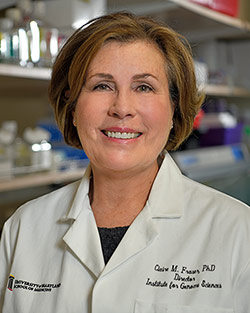 IGS was founded in 2007 by Claire Fraser, PhD, who was president and director of The Institute for Genomic Research (TIGR) in Rockville, MD and who brought with her some of the faculty from there. Dr. Fraser was instrumental in creating high-throughput sequencing which changed the field of gene discovery and was part of the team to first map the complete genetic code of a free-living organism, Haemophilus influenza. In 2023, Dr. Fraser was elected to the National Academy of Sciences based on her ground-breaking scientific accomplishments during her career in genomic and microbial sciences.
IGS was founded in 2007 by Claire Fraser, PhD, who was president and director of The Institute for Genomic Research (TIGR) in Rockville, MD and who brought with her some of the faculty from there. Dr. Fraser was instrumental in creating high-throughput sequencing which changed the field of gene discovery and was part of the team to first map the complete genetic code of a free-living organism, Haemophilus influenza. In 2023, Dr. Fraser was elected to the National Academy of Sciences based on her ground-breaking scientific accomplishments during her career in genomic and microbial sciences.
Dr. Fraser served on the search committee for the new IGS director: “With her leadership experience building a quantitative and technological oncology program at Hopkins," Dr. Fraser said. "I have no doubt that Dr. Fertig is perfectly positioned to lead IGS into the future and to new heights.”
Added Dean Gladwin: “Building on the legacy of founder Claire Fraser, PhD, the IGS is poised for even greater success by using genomic research mathematical models to enable researchers to understand the intricate interaction between genes, proteins, and environmental factors.” He is also the John Z. and Akiko K. Bowers Distinguished Professor and Dean, UMSOM, and Vice President for Medical Affairs, University of Maryland, Baltimore. “Dr. Fertig’s expertise, in using computational methods to blend mathematical modeling and artificial intelligence, will be an invaluable asset to IGS as faculty continue to revolutionize genomic science and apply technologies to basic science and clinical research.”
 IGS research spans from basic evolutionary science to human health across the lifespan, with scientists applying genomics, microbiome, and systems biology approaches to better understand health issues, evolutionary biology, and the underpinnings of aging, cancer, brain development, addiction, and mental health. Current research projects include using metagenomics (the DNA makeup of multiple species of bacteria) to learn more about the function of the microbiome in the human body and the development of brain databases that include genetic data to investigate brain regions involved in persistent HIV infections, substance use disorder, and psychiatric and neurodevelopmental disorders.
IGS research spans from basic evolutionary science to human health across the lifespan, with scientists applying genomics, microbiome, and systems biology approaches to better understand health issues, evolutionary biology, and the underpinnings of aging, cancer, brain development, addiction, and mental health. Current research projects include using metagenomics (the DNA makeup of multiple species of bacteria) to learn more about the function of the microbiome in the human body and the development of brain databases that include genetic data to investigate brain regions involved in persistent HIV infections, substance use disorder, and psychiatric and neurodevelopmental disorders.
During her 16 years at Hopkins, Dr. Fertig has built a transdisciplinary lab, with researchers spanning diverse scientific backgrounds to bridge the fields of mathematical theory, software development, cancer biology, and clinical oncology, all vital to help achieve her mission: to account for the complex evolutionary processes in cancer for therapeutic selection. With over 130 research publications, she is currently principal investigator or core lead on several National Cancer Institute Consortia grants, including the Cancer Systems Biology, Informatics Technologies for Cancer Research, and Translational and Basic Science in Early Lesions Consortia, and the National Institute of Aging Mouse SenNet Consortium. She is a co-investigator on several other major grants totaling more than $30 million.
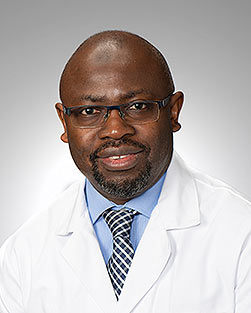 “It’s humbling to have the opportunity to take on the Directorship of IGS and continue its rich legacy tracing its roots back to TIGR and the earliest advances in modern genomics research, while personally returning to the University of Maryland System,” said Dr. Fertig. “As Director, I look forward to continuing to foster IGS’s application and development of genomics technologies throughout human health, and to building new bridges to further cancer genomics and computational biology through partnerships with the Greenbaum Comprehensive Cancer Center and the Institute for Health Computing.”
“It’s humbling to have the opportunity to take on the Directorship of IGS and continue its rich legacy tracing its roots back to TIGR and the earliest advances in modern genomics research, while personally returning to the University of Maryland System,” said Dr. Fertig. “As Director, I look forward to continuing to foster IGS’s application and development of genomics technologies throughout human health, and to building new bridges to further cancer genomics and computational biology through partnerships with the Greenbaum Comprehensive Cancer Center and the Institute for Health Computing.”
The search committee was headed by Taofeek Owonikoko, MD, PhD, the Marlene and Stewart Greenebaum Professor of Oncology at UMSOM and Executive Director of the University of Maryland Marlene and Stewart Greenebaum Comprehensive Cancer Center (UMGCCC).
“In Dr. Fertig, we found the ideal visionary who will work to align IGS with the clinical and research missions of the Greenebaum Cancer Center as well with other UMSOM clinical departments to deliver cutting-edge advances in genome research and clinical genomic testing,” said Dr. Owonikoko. “Her experience in developing novel computational methods to analyze multidimensional data from advanced sequencing technology platforms will help advance our precision medicine mission that will ultimately improve treatments and outcomes for patients.”
Dr. Fertig earned a B.S. in Physics and Mathematics at Brandeis University and received her Ph.D. in Applied Mathematics from the University of Maryland, College Park (UMCP). Her unique blend interpreting biological systems by integrating these high-throughput data with artificial intelligence and mathematical modeling techniques is informed by her background in applied mathematics and numerical weather prediction from her graduate training at UMCP. She was a postdoctoral fellow in the Department of Oncology at Johns Hopkins University before accepting a faculty position at the university.
“I want to thank our entire search committee, led by Dr. Taofeek Owonikoko who made this recruitment come to fruition,” said Dean Gladwin. “I also want to extend my deep appreciation to Dr. Jacques Ravel for his leadership, dedication, and commitment to IGS in serving as Acting Director for more than two years.”
Contact
Office of Public Affairs
655 West Baltimore Street
Bressler Research Building 14-002
Baltimore, Maryland 21201-1559
Contact Media Relations
(410) 706-5260
Related stories
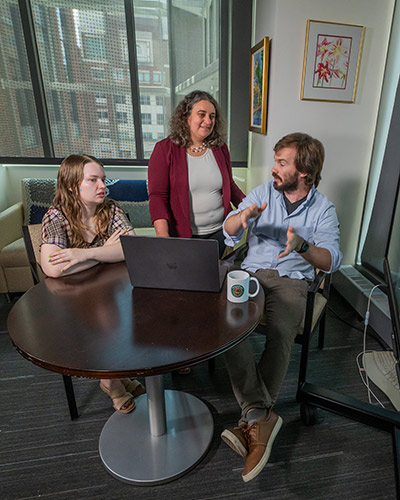
Friday, July 25, 2025
New Research Simulates Cancer Cell Behavior
In the same vein as weather forecast models that predict developing storms, researchers now have developed a method to predict the cell activity in tissues over time. The new software combines genomics technologies with computational modeling to predict cell changes in behavior, such as communication between cells that could cause cancer cells to flourish.

Wednesday, November 06, 2024
Genomic Databases Need More Diversity
It is commonly known that most genomic databases are biased toward people with European ancestry. Scientists have warned that leaving out other populations could skew results in areas such as drug development, diagnostic testing, and polygenic risk scores—which looks at many genetic variations in a person’s DNA to predict their disease risk.

Wednesday, August 24, 2022
UM School of Medicine Study Finds a New Way to Optimize Treatment Success for Fecal Transplants
Fecal transplants have been successful in treating serious diarrheal infections but have often failed when tried with other diseases. Up until now, no one could predict why these treatments sometimes failed to help restore healthy bacteria in the colon. Researchers from the University of Maryland School of Medicine’s (UMSOM) Institute for Genome Sciences (IGS) have discovered important clues that could lead more personalized approaches to optimize treatment success. They published their findings in Cell Reports Medicine online earlier this month.
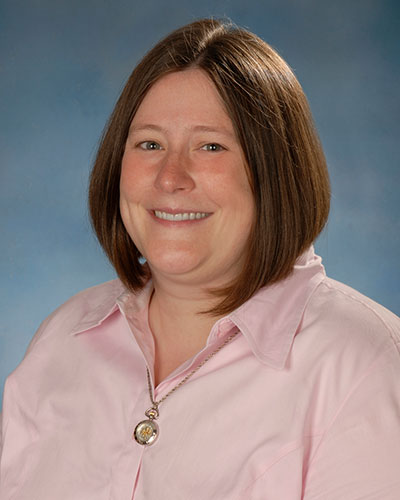
Thursday, July 28, 2022
Researchers Discover One of the Largest Known Bacteria-to-Animal Gene Transfer Inside a Fruit Fly
A fruit fly genome is not a just made up of fruit fly DNA – at least for one fruit fly species. New research from the University of Maryland School of Medicine’s (UMSOM) Institute for Genome Sciences (IGS) shows that one fruit fly species contains whole genomes of a kind of bacteria, making this finding the largest bacteria-to-animal transfer of genetic material ever discovered. The new research also sheds light on how this happens.
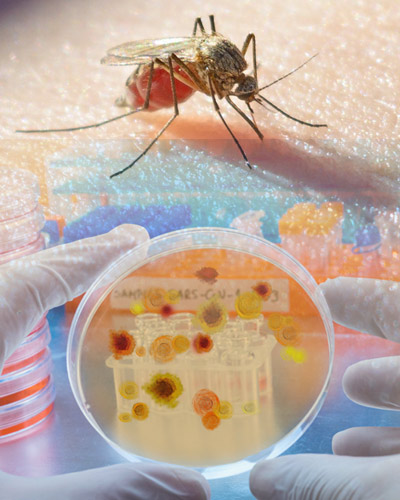
Monday, July 18, 2022
New Genomic Research Shows Why Testing Malaria Vaccines in the Clinic is as Rigorous as Natural Exposure in the Field
Malaria is the deadliest mosquito-borne parasitic infection of humans. In 2021, after a century of research, the World Health Organization (WHO) approved the world’s first malaria vaccine. That vaccine reduces the incidence of malaria infections in young children aged 5-17 months by only 30 percent, meaning that it remains critical to continue developing and testing more effective vaccines.

Thursday, March 18, 2021
UM School of Medicine Helps Maryland Conduct State-Wide Sequencing of Variants in Positive COVID-19 Test Specimens
In an effort to monitor the spread of COVID-19 variants in the State of Maryland, University of Maryland School of Medicine (UMSOM) Dean E. Albert Reece, MD, PhD, MBA, announced that UMaryland Genomics at UMSOM will perform genome sequencing of variants in at least 10 percent of COVID-19 test samples, reaching an important benchmark set by the federal government to help control the spread of these variants.

Thursday, February 25, 2021
UM School of Medicine Researchers Participate in Landmark Study Detailing Sequencing of Full Human Genomes to Better Capture Genetic Diversity
Researchers at the University of Maryland School of Medicine (UMSOM) co-authored a study, published today in the journal Science, that details the sequencing of 64 full human genomes. This reference data includes individuals from around the world and better captures the genetic diversity of the human species. Among other applications, the work will enable population-specific studies on genetic predispositions to human diseases as well as the discovery of more complex forms of genetic variation.

Wednesday, February 26, 2020
Researchers Develop First Catalogue of Genes that Comprise Community of Microbes in Vaginal Microbiome
University of Maryland School of Medicine’s (UMSOM) Institute for Genome Sciences (IGS) researchers have created the first catalogue of genes that comprise the community of microbes, which inhabit the human vagina. The catalogue, called human vaginal non-redundant gene catalog (VIRGO), was recently released as a public resource that can be used by researchers to facilitate a more in-depth understanding of the role of vaginal microorganisms in women’s health and to potentially develop future treatments for certain gynecologic conditions.
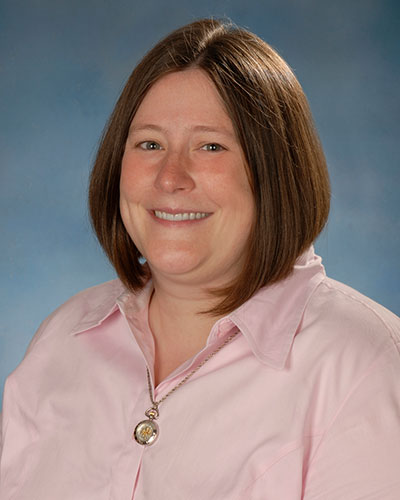
Tuesday, December 03, 2019
UM School of Medicine Researchers Institute for Genome Sciences' Researchers Discover Potential New Treatment for Tropical Parasitic Disease Using Genomics
Using innovative RNA sequencing techniques, researchers at the University of Maryland School of Medicine (UMSOM) Institute for Genome Sciences identified a promising novel treatment for lymphatic filariasis, a disabling parasitic disease that is difficult to treat. The potential new therapy is an experimental cancer drug called JQ1 and targets proteins found prominently in the worm’s genome; it appears to effectively kill the adult worms in a laboratory setting, according to the study which was published today in the journal mSystems.

Tuesday, August 13, 2019
Researchers Identify How Vaginal Microbiome Can Elicit Resistance or Susceptibility to Chlamydia
The vaginal microbiome is believed to protect women against Chlamydia trachomatis, the etiological agent of the most prevalent sexually transmitted infections (STIs) in developed countries. New research by the University of Maryland School of Medicine (UMSOM) shows how the microbiome can either protect or make a woman more susceptible to these serious infections.

Thursday, April 04, 2019
UM School of Medicine's Institute for Genome Sciences Awarded $17.5 Million Grant for Infectious Disease Research
The Institute for Genome Sciences (IGS) at the University of Maryland School of Medicine (UMSOM) was awarded $17.5 million from the National Institute of Allergy and Infectious Diseases (NIAID) to fund the IGS Genome Center for Infectious Diseases (GCID) for another five years.

Wednesday, March 27, 2019
New Study Finds That Bacteria and Immunity in the Cervix May be Key to Predicting Premature Birth
Spontaneous preterm birth (sPTB), defined as birth before 37 weeks of gestation, and the related complications, are the largest contributors to infant death in the United States and worldwide, according to the World Health Organization. Researchers at the University of Maryland School of Medicine (UMSOM) have discovered that bacteria and innate immune factors in a woman’s birth canal and cervix may increase the risk of spontaneous preterm birth or provide protection against such births.

Tuesday, February 12, 2019
UMSOM Scientists Call for Unrestricted Usage of Public Genome Data
Researchers at the Institute for Genome Sciences (IGS) at the University of Maryland School of Medicine (UMSOM) called for open access to genome data, stating that unrestricted usage is needed for progress in combating the world’s most serious diseases.
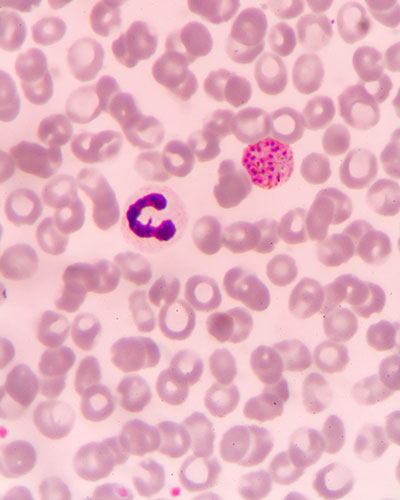
Friday, February 08, 2019
University of Maryland School of Medicine Genome Scientists Develop Novel Approaches to Studying the Most Widespread Form of Malaria
Scientists at the Institute of Genome Sciences (IGS) at the University of Maryland School of Medicine (UMSOM) have developed a novel way with genome sequences to study and better understand transmission, treat and ultimately eradicate Plasmodium vivax, the most widespread form of malaria.

Thursday, September 27, 2018
University of Maryland School of Medicine Scientist Receives Prestigious Microbiome Award
Owen White, PhD, professor of epidemiology and public health, and Associate Director for Informatics at the Institute for Genome Sciences (IGS) at the University of Maryland School of Medicine (UMSOM), has received the 2018 Microbiome Pioneer Award. The prestigious honor is part of the Bioinformatics for the Microbiome Symposium organized by Stanford University. The microbiome is the name given collectively to the community of trillions of microbial organisms that live on and within our bodies.
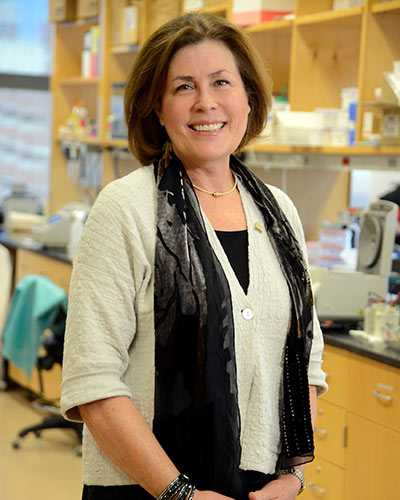
Monday, May 14, 2018
New Research: Some Gut Bacteria May Protect Against Intestinal Infection
Scientists at the University of Maryland School of Medicine (UMSOM) have for the first time found evidence that the presence of a key species in the human gut microbiome is associated with protection from infection with typhoid fever. If the research is borne out, it could offer an exciting new way to reduce intestinal infections from microbes.

Wednesday, May 25, 2016
UMSOM Researchers Develop New Way to Decode Large Amounts of Biological Data
A University of Maryland School of Medicine researcher has helped develop an innovative computing technique that, on very large amounts of data, is both faster and more accurate than current methods. To spur research, a program using this technique is being offered for free to the biomedical research community.

